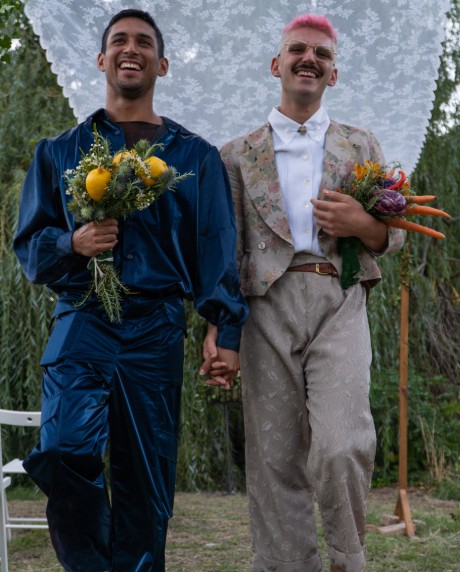Gender on Campus
Identity-
Totally Free
Identity
Politics
A study from
the agender,
aromantic, asexual
top range.
Pictures by
Elliott Brown, Jr.
NYU course of 2016
“At this time, I point out that i will be agender.
I am getting rid of myself personally through the personal construct of sex,” states Mars Marson, a 21-year-old NYU movie significant with a thatch of brief black locks.
Marson is talking-to me amid a roomful of Queer Union college students within class’s LGBTQ college student middle, in which a front-desk bin offers cost-free keys that let site visitors proclaim their unique favored pronoun. With the seven pupils gathered at the Queer Union, five like the single
they,
supposed to denote the sort of post-gender self-identification Marson defines.
Marson was born a girl biologically and was released as a lesbian in highschool. But NYU had been the truth â someplace to explore transgenderism and decline it. “Really don’t feel linked to the phrase
transgender
since it seems a lot more resonant with binary trans folks,” Marson states, making reference to individuals who need tread a linear path from female to male, or the other way around. You might declare that Marson while the some other college students at the Queer Union identify instead with becoming somewhere in the center of the way, but that’s not quite proper possibly. “I think âin the middle’ however places men and women because be-all-end-all,” claims Thomas Rabuano, 19, a sophomore crisis major which wears beauty products, a turbanlike headband, and a flowy blouse and top and alludes to Lady Gaga and the gay figure Kurt on
Glee
as large adolescent character versions. “i love to consider it as outside.” Everyone in the team
m4m dating-hmmm
s endorsement and snaps their particular fingers in accord. Amina Sayeed, 19, a sophomore from Diverses Moines, agrees. “old-fashioned ladies clothes tend to be female and colourful and emphasized the truth that I’d breasts. I hated that,” Sayeed says. “So now we claim that i am an agender demi-girl with connection to the female binary sex.”
On the far edge of campus identification politics
â the locations when occupied by gay and lesbian pupils and later by transgender people â you now discover purse of college students such as, young people for who tries to classify identity sense anachronistic, oppressive, or perhaps painfully unimportant. For more mature years of homosexual and queer communities, the endeavor (and exhilaration) of identification exploration on campus will look rather common. Nevertheless variations nowadays tend to be striking. The existing project is not just about questioning one’s own identity; it is more about questioning the actual nature of identification. You might not end up being a boy, however may not be a female, either, and how comfortable could you be together with the notion of becoming neither? You might want to rest with men, or females, or transmen, or transwomen, and you also must come to be mentally involved with them, too â but perhaps not in identical combination, since why would the romantic and intimate orientations fundamentally need to be the exact same thing? Or precisely why think about direction at all? The appetites might-be panromantic but asexual; you could determine as a cisgender (not transgender) aromantic. The linguistic choices are nearly limitless: an abundance of vocabulary designed to articulate the role of imprecision in identification. And it’s a worldview that is truly about words and feelings: For a movement of young people moving the boundaries of desire, could feel extremely unlibidinous.

A Glossary
The Specialized Linguistics for the Campus Queer Movement
A few things about gender haven’t altered, and never will. But also for those who are just who decided to go to school decades ago â or even just a few years ago â many of the newest intimate terminology is unknown. Under, a cheat sheet.
Agender:
somebody who identifies as neither male nor female
Asexual:
a person who does not discover libido, but which may experience intimate longing
Aromantic:
somebody who doesn’t encounter intimate longing, but really does knowledge sexual interest
Cisgender:
maybe not transgender; the state when the sex you determine with matches usually the one you were assigned at delivery
Demisexual:
individuals with restricted sexual desire, often believed only in the context of strong psychological connection
Gender:
a 20th-century restriction
Genderqueer:
one with an identification outside the old-fashioned sex binaries
Graysexual:
a more wide phase for someone with minimal sexual interest
Intersectionality:
the fact that sex, competition, class, and sexual orientation can’t be interrogated by themselves from a single another
Panromantic:
a person who is romantically thinking about any person of every sex or orientation; it doesn’t fundamentally connote accompanying sexual interest
Pansexual:
someone who is actually sexually thinking about anybody of any gender or orientation
Reporting by
Allison P. Davis
and
Jessica Roy
Robyn Ochs, a former Harvard officer who was simply at school for 26 many years (and who began the college’s group for LGBTQ professors and staff), views one significant reason why these linguistically complicated identities have actually out of the blue come to be very popular: “we ask young queer people how they learned labels they explain themselves with,” states Ochs, “and Tumblr may be the number 1 answer.” The social-media program provides produced so many microcommunities global, such as Queer Muslims, Queers With Disabilities, and Trans Jewry. Jack Halberstam, a 53-year-old self-identified “trans butch” teacher of gender researches at USC, specifically alludes to Judith Butler’s 1990 book,
Gender Difficulty,
the gender-theory bible for university queers. Estimates from this, like much reblogged “there’s absolutely no sex identification behind the expressions of gender; that identity is actually performatively constituted by the really âexpressions’ that are reported to be their results,” are becoming Tumblr lure â probably the earth’s the very least likely widespread content.
But some of the queer NYU students we spoke to didn’t be truly familiar with the language they today use to describe by themselves until they reached university. Campuses are staffed by directors whom emerged old in the 1st revolution of governmental correctness and also at the level of semiotics-deconstruction mania. In school today, intersectionality (the idea that race, class, and gender identity are common linked) is actually central on their means of recognizing just about everything. But rejecting categories completely is generally sexy, transgressive, a good strategy to win an argument or feel unique.
Or maybe that’s as well cynical. Despite exactly how severe this lexical contortion might seem to some, the students’ desires to determine themselves outside gender felt like an outgrowth of intense distress and strong scars from becoming raised in to-them-unbearable character of “boy” or “girl.” Establishing an identity this is certainly defined by what you
aren’t
doesn’t look especially easy. I ask the students if their brand new cultural permit to understand by themselves beyond sexuality and gender, if the sheer plethora of self-identifying possibilities they will have â such as for example Twitter’s much-hyped 58 gender choices, from “trans individual” to “genderqueer” towards the vaguely French-sounding “neutrois” (which, relating to neutrois.com, may not be described, because extremely point of being neutrois would be that your own gender is actually individual for you) â often renders all of them experience as if they are going swimming in area.
“i’m like i am in a chocolate shop so there’s each one of these different options,” claims Darya Goharian, 22, an elderly from an Iranian household in a rich D.C. area whom identifies as trans nonbinary. But even phrase
options
are also close-minded for many for the party. “we simply take concern with that term,” claims Marson. “it creates it appear to be you are deciding to end up being one thing, when it is perhaps not a variety but an inherent part of you as individuals.”
Amina Sayeed identifies as an aromantic, agender demi-girl with connection to the female binary gender.
Picture:
Elliott Brown, Jr., NYU course of 2016
Levi straight back, 20, is actually a premed who had been practically knocked away from general public senior high school in Oklahoma after coming-out as a lesbian. But now, “I determine as panromantic, asexual, agender â just in case you wanna shorten all of it, we could just go as queer,” right back states. “I don’t encounter sexual interest to any person, but I’m in a relationship with another asexual person. Do not have sexual intercourse, but we cuddle all the time, kiss, write out, hold arms. Whatever you’d see in a PG rom-com.” Straight back had previously dated and slept with a female, but, “as time went on, I became less thinking about it, and it also turned into more like a chore. What i’m saying is, it thought great, but it couldn’t feel just like I became developing a solid link throughout that.”
Now, with Back’s current girl, “lots of why is this relationship is the psychological link. And just how open we are together.”
Back has started an asexual team at NYU; ranging from ten and 15 folks typically appear to group meetings. Sayeed â the agender demi-girl â is regarded as them, also, but recognizes as aromantic versus asexual. “I had got gender by the point I happened to be 16 or 17. Ladies before kids, but both,” Sayeed claims. Sayeed continues to have intercourse sporadically. “But Really don’t discover any type of romantic appeal. I got never ever understood the technical term because of it or whatever. I’m however in a position to feel love: I adore my buddies, and I also love my loved ones.” But of dropping
in
really love, Sayeed claims, with no wistfulness or doubt this particular might alter afterwards in life, “i assume I just you shouldn’t see why I actually would now.”
Really from the individual politics of the past involved insisting about right to rest with anyone; now, the sexual drive seems these types of a minimal element of the politics, which include the authority to say you really have little to no aspire to rest with anyone anyway. Which may frequently run counter towards the a lot more traditional hookup culture. But instead, maybe this is actually the then logical step. If setting up has carefully decoupled sex from love and emotions, this activity is actually clarifying that one could have relationship without intercourse.
Although the rejection of intercourse is not by option, always. Maximum Taylor, a 22-year-old transman junior at NYU whom also recognizes as polyamorous, states that it is been harder for him currently since he began taking human hormones. “i can not visit a bar and grab a straight girl and possess a one-night stand easily anymore. It turns into this thing where if I wish to have a one-night stand I have to explain i am trans. My swimming pool of individuals to flirt with is actually my area, where a lot of people know each other,” says Taylor. “Typically trans or genderqueer folks of color in Brooklyn. It is like I’m never ever going to meet some one at a grocery store once more.”
The difficult vocabulary, too, can function as a layer of security. “You can get extremely comfy here at the LGBT heart acquire familiar with individuals asking the pronouns and everyone once you understand you’re queer,” states Xena Becker, 20, a sophomore from Evanston, Illinois, which determines as a bisexual queer ciswoman. “But it’s however truly depressed, hard, and perplexing most of the time. Just because there are many more words doesn’t mean that thoughts tend to be much easier.”

Added reporting by Alexa Tsoulis-Reay.
*This article appears from inside the October 19, 2015 problem of
New York
Mag.